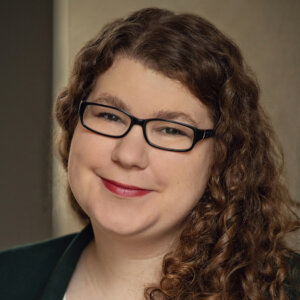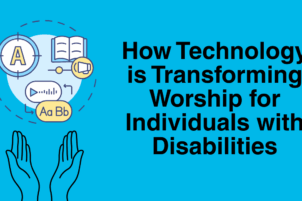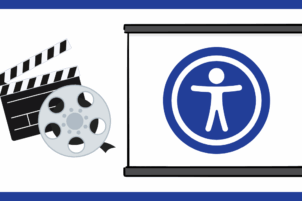
Hannah Roussel
The Jewish High Holidays are a time of coming together. Many Jews return to their hometowns for traditional Rosh Hashana meals and to break Yom Kippur fasts with their families. Jews who attend synagogues frequently welcome people whose attendance is more sporadic. The latter group often includes people with disabilities, who find synagogue attendance difficult due to accessibility issues, but want to make something work for the holiest of days.
RespectAbility’s resources include the new 5784 High Holiday Guide to Inclusive Congregations to assist you in making your High Holiday celebrations accessible. But changing our physical surroundings is only one side of the accessibility coin. We need to consider how the texts we interact with and teach have been used to promote ableism and/or would be considered ableist if written today.
In addition to being a time of gathering, the High Holidays are also a time of spiritual purification and renewal. For this reason, many Jews practice the tradition of wearing white to High Holiday services. Personally, I wear a white kippa in place of the colorful kippot I normally don.
But I also have a complicated relationship with certain Jewish traditions about purity. Take for example Leviticus 21:16-23, in which God lists “defects” that disqualify priests from performing sacrifices and entering the holiest spaces in the Temple. Some of these “defects” include being blind, having “a limb too short or too long,” or crushed testicles, or “a boil-scar,” and other bodily variations. Such bodies, God states, “shall not profane these places sacred to Me, for I the Lord have sanctified them.”
As a Jew preparing to enter into the High Holidays, the holiest days of the year, how am I supposed to respond to these verses? I don’t have any of the physical variations listed in these verses, but I am disabled. My left ear is hard of hearing. My lungs, scarred by an autoimmune disease and COVID, limit my physical capabilities. My brain is neurodiverse. Is my body blemished? Will its presence in synagogue this High Holiday season profane God’s sacred space? Is it incongruous and disingenuous to cover my disabled body in a white kippa?
My answer to these questions is an emphatic NO. It says elsewhere in scripture that we are all created in God’s image (Genesis 1:26-27, 5:1-2, and 9:6 are a few examples). This concept, B’tselem Elohim (“In God’s Image”), is a core tenet of Judaism. My neurodiverse brain, overactive immune system, and scarred ear drum and lungs are all in God’s image, and thus cannot profane God’s holy spaces.
How do I reconcile B’tselem Elohim with Leviticus 21:16-23? Rabbi Julia Watts Belser, a leading scholar of ancient Judaism and disability, reminds us to read these verses in their historical, scriptural, and theological contexts. She cites scholarship that compares the priestly qualifications listed in Leviticus 21 to the qualifications kings of that time and place (ancient Mesopotamia) made of their attendants. Rabbi Belser concludes that these were not qualifications God placed on the priests, but rather human qualifications of the time and culture that were placed onto God. God is often referred to as a king (Isaiah 44:6 and Psalm 47:3 are but two examples), and so it would make sense that ancient Israelites would want God’s attendants, the priests, to have the same qualifications as a king’s attendants.
When we pair this historical context with the scriptural and theological context that all humans are created in God’s image, Leviticus 21:16-23 takes on a different meaning. It is not a divine statement that some bodies are unfit for sacred space and service, but rather a reminder of how false, ableist judgements of the human body “have been scripted even onto God.” Rabbi Belser reads these verses as “a call to witness the long shadow of stigma and exclusion that has shaped the lives of so many disabled people, a call to confront and to challenge entrenched patterns of social and religious violence that have contoured our lives.”
This High Holiday season, as we enter into communities with various accommodations and levels of disability awareness, or as we welcome those into our congregations that do not usually attend, let us remember what it means to be made pure—not a miraculous healing of “blemished bodies” but rather a communal healing of ableist ideology, discrimination, and exclusion, ideology that is so pervasive and persistent that it has lasted across time and place and is even at times placed onto God. Let us consider how this new year can lead us closer to a world of radical inclusion and acceptance.








Hannah, enjoyed your piece.